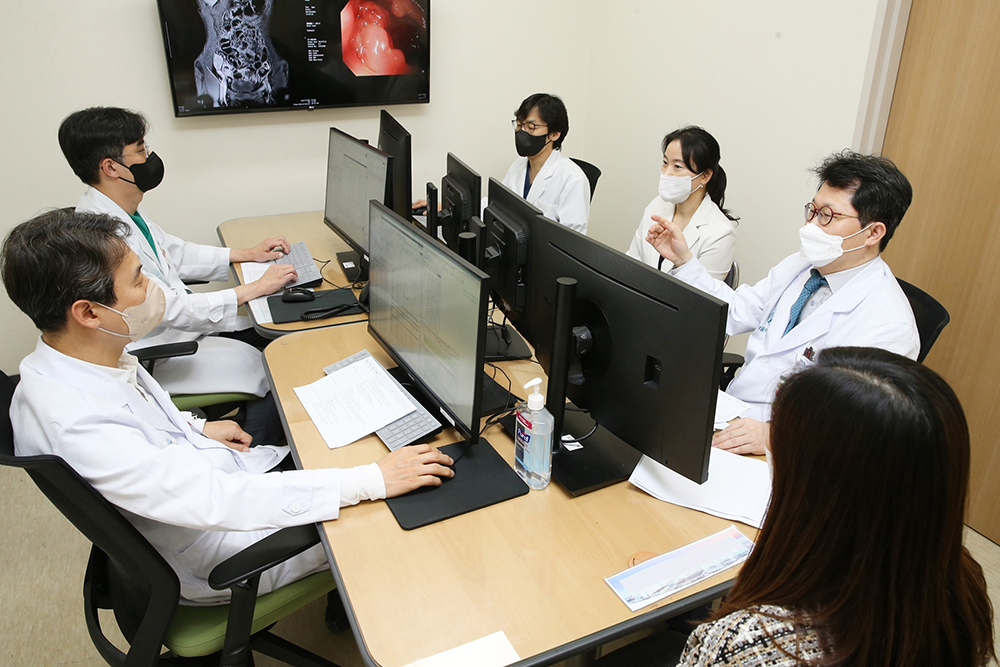-
- Global AMC MENU
- NEWS
- HEALTH
- PEOPLE
- Introduction
Korea’s largest Multidisciplinary Inflammatory Bowel Disease Clinic with more than 12,000 ulcerative colitis and Crohn’s disease patients
Playing the leading role by performing 40% of Crohn’s surgery in Korea, achieving World’s first research findings, training international physicians, and more
Director Byong Duk Ye “Will contribute to improving the levels of treatment and research based on accumulated experience and knowledge”

▲AMC medical staffs of the Multidisciplinary Inflammatory Bowel Disease Clinic are discussing the treatment direction of inflammatory bowel disease patient.
Inflammatory bowel disease of unknown etiology, causing inflammation in the intestines, cannot be cured completely. That is why early diagnosis, appropriate treatment, and lifelong management are important. The Inflammatory Bowel Disease Center of Asan Medical Center (AMC) has taken the lead in treating patients with these inflammatory bowel diseases and now celebrates its 10th anniversary.
AMC was the first in South Korea to open a clinic in 1993 for ulcerative colitis and Crohn’s disease, which was later expanded in 2012 to become South Korea’s first inflammatory bowel disease center that has worked on the treatment, research, and education of inflammatory bowel disease patients.
More than 12,000 inflammatory bowel disease patients are registered with AMC’s Inflammatory Bowel Disease Center. This indicates that 15% of inflammatory bowel disease patients in South Korea have received treatment at AMC, making it a single medical institution with the most clinical experience.
AMC’s Inflammatory Bowel Disease Center offers professional and specialized medical services through seven special clinics as follows: Ulcerative Colitis & Crohn’s Disease Clinic, Intestinal Behçet's Disease Clinic, Inflammatory Bowel Disease Surgical Clinic, Pediatric Inflammatory Bowel Disease Clinic, Inflammatory Bowel Disease Transition Clinic, Multidisciplinary Inflammatory Bowel Disease Clinic, and Clinical Research Clinic.
The Multidisciplinary Inflammatory Bowel Disease Clinic, in particular, is the largest of its kind in South Korea and involves healthcare professionals from various medical departments including the Division of Gastroenterology, Division of Colon and Rectal Surgery, Department of Radiology, and Department of Pathology. The clinic has been providing customized treatment for each patient through a treatment system of close cooperation.
The Inflammatory Bowel Disease Surgical Clinic is making efforts to ensure that patients with Crohn’s disease and ulcerative colitis that require surgical procedures (hereinafter-Crohn’s surgery) to remove part of the intestines can receive the best surgery in the timeliest manner.
Since the first Crohn’s surgery performed in 1991, Crohn’s surgery cases reached 1,000 in 2016 and more than 100 cases of Crohn’s surgery are performed every year. Recently, more than half of Crohn’s surgeries performed at the center are minimally invasive laparoscopic surgeries, and about 40% of inflammatory bowel disease surgeries in South Korea are performed at AMC.
AMC’s Inflammatory Bowel Disease Center has made a great many achievements worldwide in research for the treatment of inflammatory bowel disease. In 2014, the center was the first in the world to discover a gene that causes leukopenia, one of the side effects of the immunosuppressant ‘Thiopurine’ used to treat inflammatory bowel disease patients.
Thiopurine is a drug commonly used to treat inflammatory bowel disease patients as well as other patients with autoimmune diseases and those who underwent organ transplantation. The research findings were reflected in the treatment guidelines for relevant diseases and published in ‘Nature Genetics,’ the prestigious Genetics journal.
In 2019, the center published findings of a phase 3 study on the treatment effect of CT-P13, an anti-TNF antibody biosimilar, for the treatment of Crohn’s disease in ‘The Lancet,’ a global academic journal. The study was the first of its kind in the world and the findings provided a foundation for the extrapolation of biosimilar indications. Extrapolation of indications means that if the efficacy of a biosimilar is proven to be non-inferior to the original drug in one disease, the biosimilar can be used in all other indications of the original drug.
These excellent treatment results and research of AMC’s Inflammatory Bowel Disease Center have attracted medical scientists to visit the center from all over the world. Over the last decade, more than 180 foreign medical scientists from 25 countries including medically advanced countries such as the U.S., U.K., and Germany visited AMC’s Inflammatory Bowel Disease Center to learn relevant skills and knowledge in addition to experiencing a systematic, specialized medical treatment system.
Also, from 2016 to 2018, the center arranged the first training program in Asia for Vietnamese healthcare professionals. After completing the training at AMC, the trainees returned to Vietnam and held inflammatory bowel disease workshops to pass on their knowledge and skills, playing a great role in improving the level of inflammatory bowel disease treatment in Vietnam.
Training is also ongoing for domestic human resources development in the field of inflammatory bowel disease. Regular seminars are held quarterly and an annual symposium is held to share the latest knowledge with relevant healthcare professionals. Efforts are also made to develop nursing personnel specialized in inflammatory bowel disease, and arrangements are made through patient communities to set time aside to exchange information and socialize with patients.
Professor Byong Duk Ye, the Director for AMC’s Inflammatory Bowel Disease Center, said, “I believe we were able to achieve both quantitative and qualitative growth based on the experience and knowledge accumulated from the 90s as we had been fully committed to inflammatory bowel disease.”
He added, “The number of inflammatory bowel disease patients continues to increase each year due to westernized dietary habits and microbial imbalance in the intestines, so we will further do our best to contribute to improving the levels of treatment and research at home and abroad.”












